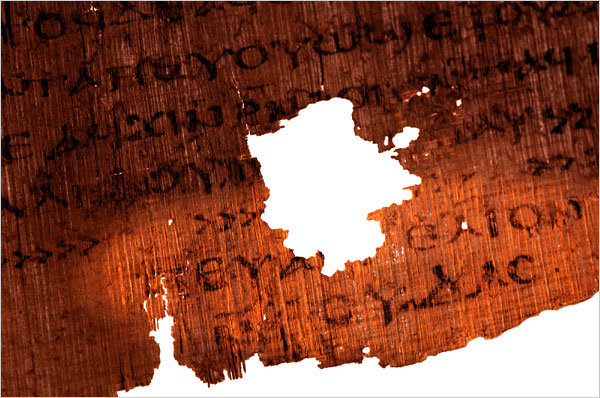| Want to send this page or a link to a friend? Click on mail at the top of this window. |
More Science and Technogy |
| Posted April 7, 2006 |
| Return to previous and related text |
| Document Is Genuine, but Is Its Story True? |
 |
Kenneth Garrett/National Geographic Society |
| The Gospel of Judas is the latest Gnostic text discovered in Egypt. |
By LAURIE GOODSTEIN |
In 1959, when the Gospel of Thomas was first published in English, many Christians were shocked to learn that any gospels existed other than Matthew, Mark, Luke and John.
It was also the first time that most Christians had ever heard about the Gnostics — Christian communities in the second through fourth centuries whose scriptures and spiritual beliefs barely resemble what is now thought of as traditional Christianity.
But the Gospel of Judas, another piece of Gnostic scripture, has been released in a very different era. It is a time when many Christians have been bombarded by competing claims about their faith and its history, and some are grappling with how to absorb it all.
Gnosticism has become practically a household word, largely thanks to the novel "The Da Vinci Code," as well as to scholars of early Christianity like Elaine Pagels, who write for a popular audience.
Many more Gnostic Gospels have been translated and distributed — Mary Magdalene, Philip, Thomas and even "The Gospel of Truth." Some churches are holding study groups to pick over books on the "historical Jesus."
The Gospel of Judas is only the latest crumbling parchment to surface in the sands of Egypt like an ancient time capsule. Even before its formal introduction at a National Geographic Society news conference yesterday, scholars have been part of a debate that will soon be echoing in churches, on the Web and in Christian publishing.
The real debate is whether the text says anything historically legitimate about Jesus and Judas.
Some of the scholars on National Geographic's advisory committee said the text should prompt a reassessment of Judas. In it, Jesus speaks privately to Judas, telling him he will share with Judas alone "the mysteries of the kingdom." Jesus asks Judas to turn him over to the Roman authorities so that his body can be sacrificed.
Craig Evans, a professor of the New Testament at Acadia Divinity College in Wolfville, Nova Scotia, and a scholar on the National Geographic panel, conjectured that some of the dialogue between Jesus and Judas may have been spoken in private, and so did not make its way into the New Testament Gospels, which are more likely to treat Jesus' public statements.
"It is possible that the Gospel of Judas preserves an old memory that Jesus had actually instructed Judas in private, and the other disciples did not know about it," Dr. Evans said.
Ms. Pagels, a religion professor at Princeton, said the discoveries of the Gospel of Judas and other Gnostic texts were "exploding the myth of a monolithic Christianity."
The reaction of other scholars is that the Gospel of Judas is interesting but no challenge to the New Testament.
"The manuscript tells us nothing about the historical Jesus or the historical Judas," said Ben Witherington III, professor of New Testament interpretation at Asbury Theological Seminary in Wilmore, Ky. "It tells us a lot about a group that were labeled heretics in their own day."
Scholars on all sides agree that the text was probably produced by a scribe in a Gnostic community of Cainites — early Christians who regarded the traditional villains of the Bible, including Cain and Judas, as heroes.
"There is no evidence that any of these documents ever represented mainstream Christianity," Professor Witherington said. "The Cainites were always on the fringes of their own movement."
He said that unlike the Gospels of Matthew, Mark, Luke and John, which were written in Christianity's first century, Gnostic works were produced in the second century and afterward. To say that the Gospel of Judas reveals anything factual about Judas, Dr. Witherington said, "is like saying a document written 150 years after George Washington died tells us the inside truth about George Washington."
Another member of the National Geographic panel of scholars, the Rev. Donald Senior, said the Gnostic gospels could undermine Christianity only if many Christians were to adopt the kind of conspiracy thinking that undergirds "The Da Vinci Code": that an "orthodox elite" of early church authorities suppressed the free-thinking, spiritual Gnostics "for the sake of uniformity and conformity."
Father Senior, president of the Catholic Theological Union in Chicago and a member of the Pontifical Biblical Commission, which advises the pope, said the Vatican was unlikely to regard the Gospel of Judas as a threat. He said that the Roman Catholic Church's likely response would be to "affirm the canonical texts" in the New Testament, rather than seeking to refute each new discovery.
"If the Gospel of Judas suddenly became something that hundreds of thousands of Christians were claiming as their revelation and scripture, perhaps the church would come out with some kind of statement," Father Senior said in an interview. "But mostly I think it's just not even on the radar screen."
He added, "I'm just glad it wasn't found in a bank vault in the Vatican."
Copyright 2006 The New York Times Company. Reprinted from The New York Times, National, of Friday, April 7, 2006.
| Wehaitians.com, the scholarly journal of democracy and human rights |
| More from wehaitians.com |